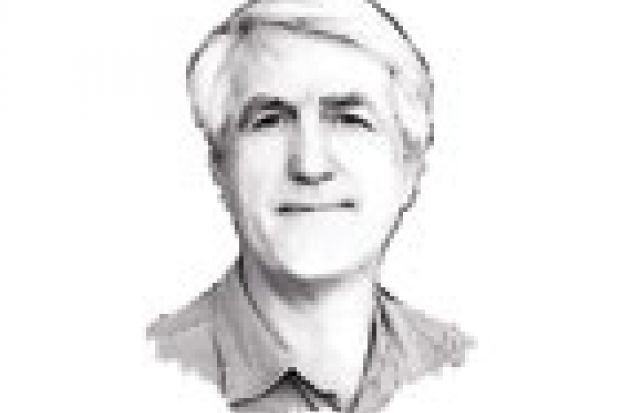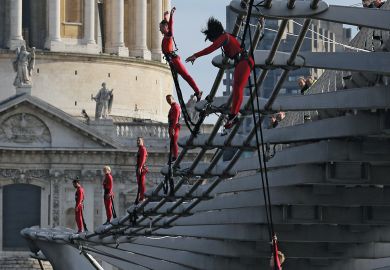Charles Olson once wrote, “I take SPACE to be the central fact to man born in America…I spell it large because it comes large here. Large, and without mercy.” Gertrude Stein famously remarked of Oakland, California, that there was no there, there. There is an awful lot of America like that. I gave a lecture once at a university in a town that existed, it was said, only because that was where the wheels dropped off the wagons. There was certainly plenty of space. Whichever way you looked, you could see the curvature of the Earth. In the churches they spoke of mercy, but didn’t mean it if you voted anything but corn-fed Republican. This was a place whose principal manufacture consisted of turning nouns into verbs and vowels into diphthongs.
There were bright faculty members there because they couldn’t get jobs at universities in places that actually existed. The two largest buildings on the campus were the football stadium and Ag Hall, where things agricultural – and therefore beyond my understanding – took place.
I was there to give a lecture on literature, but you didn’t have to be there long to see that that might be a losing game. The university bookshop stocked only course books, piled high like a paper cityscape. They were mostly on ruminants through history, although there was a small pile labelled Black/Women’s and Other Studies. Most of the space was given over to sweatshirts, decals saying “Go Tigers” and various cuteries – especially tigers, lots of tigers.
Unfortunately, they were not students of literature but of soil mechanics…I could see in their eyes that I had lost them shortly after saying ‘Hello’
When the time came, there were no more than half a dozen students, plainly present because of threats delivered by the three or four faculty who by rights should have been at Princeton or at least Miami State. One of them left and returned with a whole class, press-ganged, as Britain’s Royal Navy once did passing drunks, signing them up to a lifetime of rum, sodomy and the lash. In contrast, though, this university was in a dry state and sodomy, at the time, still a crime punishable by life imprisonment let alone an eternity in hell. Unfortunately, they were not students of literature but of soil mechanics. In an effort to reach out to them I considered invoking Pearl Buck’s The Good Earth, William Faulkner’s Intruder in the Dust or Evelyn Waugh’s A Handful of Dust, but I could see in their eyes that I had lost them shortly after saying “Hello”. A young woman in the front row had the smile of someone who knew she was saved, I was damned, and that the Rapture was seconds away.
Outside it was 110°F in the non-existent shade. Inside, it was cold enough for Captain Oates to consider being gone for some time. The air-conditioning dried the sinuses as the atmosphere was once stripped from Mars. For some reason I had written a few words on the blackboard, ignorant of the fact that I was in some sort of electronic alternative universe where I was supposed to upload texts to save students visiting the library.
“Hey teach,” said a young man who was plainly saving his energy for the big game in that his feet were on the chair in front of him and he had “Go Tigers” on his sweater. “You don’t spell that right.”
“Ah,” I said. “Of course you’re correct. You spell it with a zed.”
“What’s a zed?”
“We call zed what you call zee.”
“You call zee, zed?”
“That’s right.”
“So what do you call ‘c’?”
“No more questions,” said the woman chairing my failure to communicate.
The class returned to contemplating the earth, in that US state apparently regarded as being just 10,000 years old with dinosaurs going into the Ark in twos along with their prey.
I joined the faculty for a glass of Kool-Aid, which is like Listerine without the kick. Later, though, I knew there was better in store since one of them had whispered “vodka”, a word in which many of those who should have been at Princeton had learned to be fluent as they gathered to read week-old samizdat copies of The New York Times, a newspaper not at that time generally available. Its motto, “All the news that’s fit to print”, didn’t coincide with local definitions that excluded bodily functions, unless those of herbivores.
If this sounds condescending, what else have we got left after losing an empire? Other people’s priorities are not ours. After all, 90.1 per cent of the British live in cities despite the fact that traffic, in London, travels at the speed wagons did in the 19th century (seriously, 10 miles an hour) and we die of pollution (29,000 in the UK in 2008, according to the Committee on the Medical Effects of Air Pollutants) or boredom sitting in traffic jams (32 hours a year). We can’t see the stars at night and are crushed into Tube trains that are no cooler than Kansas in August. We, too, prefer faith to facts. After all, Tony Blair did not think he was right in going into Iraq; he believed it.
So why do we travel to give lectures? Surely today, when classes can be delivered to 250,000 people at once and the assessments marked by a computer, we can stay at home and perhaps send an avatar to meet with other avatars in a virtual university.
The distinction between the real and the virtual is anyway steadily being eroded as of course it was centuries ago, although no more than 100 of them, of course. After all, recently, a woman in the “real” world divorced her husband because he had committed adultery in a virtual one. Virtual adultery, I would guess, is the electronic equivalent of Kool-Aid.
Register to continue
Why register?
- Registration is free and only takes a moment
- Once registered, you can read 3 articles a month
- Sign up for our newsletter
Subscribe
Or subscribe for unlimited access to:
- Unlimited access to news, views, insights & reviews
- Digital editions
- Digital access to THE’s university and college rankings analysis
Already registered or a current subscriber? Login




